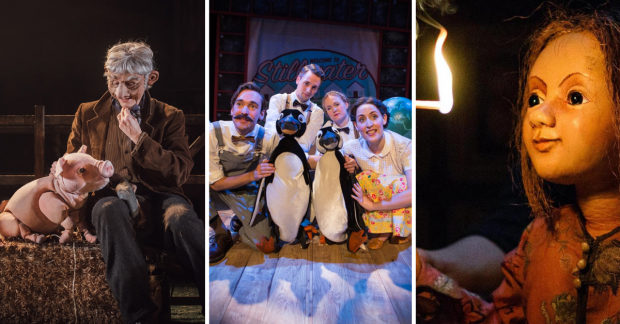Christmas children's theatre shouldn't be all fun and games
Lucinda Everett on her earliest panto memories, and how Christmas is an important time to get children into theatre

© David Monteith-Hodge/Helen Murray/Steve Tanner
I can still remember the first piece of theatre I watched. It was Christmas time, I was seven, and the show was my local playhouse’s annual pantomime – Cinderella. I remember the joyous abandon I felt booing at the baddie, how quickly I cottoned onto the ‘oh yes we cans’ and the ‘he’s behind yous’, and my giddy excitement when I was chosen to go onstage. The bright footlights have erased any memory of what happened as I trod the boards but I’ll never forget clutching my goody bag on the way home, and writing in my diary that my favourite actor was the one who forgot his lines then dropped out of character entirely – an innate reaction, I now see, to the delights of metatheatricality.
Twenty-something years later, I’ve acted in theatre, written about it, reviewed it, gained a masters in it, and created it myself. I’m not sure if any of those things would have happened without that most crucial of traditions: Christmas family theatre.
For children living in London there is, of course, a year-round flurry of shows to catch. In larger or particularly arts-focused town and cities, there is also much on offer outside of the festive period. But for many children, Christmas theatre provides their first tastes of the art form, and this early experience is what later turns them into its supporters and creators.
'Some might argue panto is closer to what Shakespeare’s spectators experienced than anything going on at the Globe'
And while family theatre, particularly panto, sometimes gets a bad rap from the purists, to my mind it can be hugely edifying. Its interactive elements provide a glimpse into our theatrical roots; some might argue that the audience participation free-for-all offered by panto is closer to what Shakespeare’s spectators experienced than anything going on at the Globe. What’s more, in an attempt to hook young fans, family theatre is often at pains to include contemporary content and forms. The regular appearance of 3D video animations in London’s bigger pantos, and the references to social media or popular TV shows that pepper many family shows teach children that theatre isn’t something irrelevant and antiquated. It can be about them – their interests, their concerns, their world. It can even be about what the future might hold. As for shows born out of the TV programmes themselves – Peppa Pig's Big Surprise is just one of this season’s offerings – I’m all for them. Whatever gets those little bottoms onto the red velvet upholstery.
Perhaps the most surprising element of children’s Christmas theatre, though, and one of its most important, is that it isn’t all fun and games. Take Hetty Feather, which spent Christmas at The Lowry last year during a UK tour. Adapted from a Jacqueline Wilson book, it follows the adventures of a willful foundling child on the hunt for her mother. Suffice it to say that some of her experiences along the way are less than festive. Then there’s Emma Rice’s stunning The Little Matchgirl at the Sam Wanamaker this Christmas, which positions both the eponymous heroine and Thumbelina as refugees of war, struggling to find a community that will protect them.
'These bittersweet shows introduce children to theatre’s ability to evoke in us a whole glorious mess of emotions
Yes, such revelations can be upsetting for young audience members but they’re also an engaging way of encouraging children to think about those less fortunate than themselves at Christmas. A gentle introduction to some of life’s challenges and cruelties, they might even provoke children to take action, leading them to recognise theatre as a political force for change (if not right away, then hopefully with hindsight).
But best of all, these bittersweet shows introduce children to theatre’s most magical power: its ability to evoke in us a whole glorious mess of emotions, from heart-swelling joy, to palm-sweating terror, to utter devastation. As Aristotle argued in his seminal text, Poetics, theatre’s incitement of negative emotions in us (the two he discusses are usually translated as pity and fear) allows us to purge them – a catharsis that leaves us feeling lighter. But it also means that, when we encounter these emotions in real life, we’re better equipped to deal with them. And that’s something I certainly remember benefiting from as a child.
'Christmas theatre strengthens spirits as much as it lifts them'
You see, the first piece of theatre I watched was Cinderella. But the first piece of theatre I attended was about two Christmases earlier. It was an adaptation of the television show Button Moon and I spent most of it sitting on my babysitter’s lap, my head buried in her hair, after something spooked me early on. It was undoubtedly a more frightening experience than Cinderella, but it was no less formative. And as years passed and I encountered other fearful situations, I used Button Moon as a sort of talisman. If I could get through that show and still manage some brief moments of courage (I forced myself to periodically to look at the stage) then I could handle what was going on right now.
At the end of a year that may have proved confusing, frightening, exciting, or any of the above for young people, Christmas theatre strengthens spirits as much as it lifts them.












